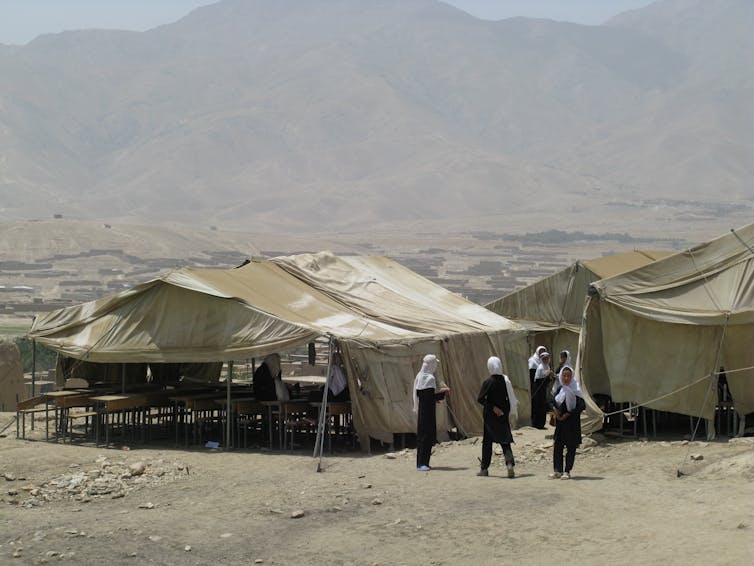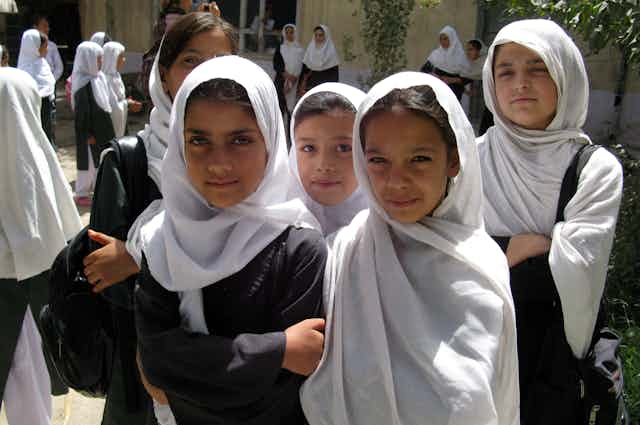The Taliban appeared to be walking away from peace talks with the Afghan government — until, at the end of May, they suddenly agreed to a proposed meeting in Istanbul.
But they stipulated major constraints, with a senior leader relaying, according to Voice of America, that the agenda shouldn’t include making decisions on critical issues, the conference must be short and the Taliban delegation should be “low level.” These conditions effectively render the meeting meaningless, and it’s likely that one of the critical issues the Taliban wish to avoid discussing is education. The Taliban have dismissed progress in education in Afghanistan as yet another manifestation of foreign occupation, and has used this as justification to attack schools, students and teachers.
It is clearly counter to Taliban interests to acknowledge the intense demand Afghan children and their families have for education, and their courageous efforts to realize that demand under the improved schooling conditions that have mercifully come about since 2001.
But now it’s not only the Taliban that have an interest in dismissing and downplaying these achievements. The United States government is absolving itself of Afghanistan through a plan to withdraw by Sept. 11, peddling a narrative that it isn’t responsible for the country’s future. It’s also turning its back on Afghanistan’s educational gains.

Justifying attacking schools
The Taliban have not claimed responsibility for the deplorable attack recently carried out May 8 against the Sayed Al-Shuhada School in Dasht-e-Barchi, a neighbourhood in West Kabul where members of the Hazara ethnic minority live. The attacks took the lives of at least 85 people, mostly schoolgirls. But suspicion of Taliban involvement is justified given their history of violence against educational institutions and the view — shared with some other Sunni Islamist extremist groups — of the Shia Hazaras as heretical.
Yet, despite the Taliban’s casual downplaying of the very significant social change that has swept Afghanistan since the end of its rule, the last two decades have stood out in stark contrast to not only the time when the Taliban ruled the country, but also as an exceptional period in the overall history of the country’s efforts to establish and expand public education.

Expansion of Afghan education
In 1950, six per cent of Afghan children — fewer than 100,000 — attended school, almost all of them boys. By 1960, this figure had close to doubled and girls accounted for just over 10 per cent of elementary students. By 1978, more than a million students were in primary and secondary schools, but still only about 15 per cent were girls.
Even under the Soviet-backed regime that introduced compulsory education aimed at paving the way for changing the socio-political structure of the country, 90 per cent of the population remained illiterate. By 1991, 33 per cent of children attending elementary school were girls, but the student population had dropped to only 628,000 kids with 182,000 enrolled in secondary schools.
Then, the Mujahideen forces seized power, initiating the decimation of the modest progress made over the past century. In 1995, when the Taliban started closing down girls’ schools, there had been 103,256 girls in public schools in Kabul and 7,793 female teachers. By May 1996, there were none at all. A small minority of girls managed to access clandestine schools, at great risk, but the public school system for girls effectively no longer existed.
The right to human development
Indeed, research in in 2007 and 2010 showed that a considerable portion of Afghan refugees in Iran and Pakistan, had fled Taliban-controlled Afghanistan primarily so that their children could go to school.
These families had seen up close what a society stripped of educational opportunity looked like. They knew that education would be the most enduring capital they could give their children. And they are right: education is essential for human development.
Countries’ literacy rates predict their GDPs, as well as health outcomes, including child and infant mortality rates. If the Taliban insist on denying access to a good quality education to all children, girls and boys, they effectively guarantee Afghans a future of poverty and chronic underdevelopment.
In 2009, journalist Sharmeen Obaid-Chinoy interviewed Qari Abdullah, a Taliban commander in charge of recruiting children as suicide bombers. He told Obaid-Chinoy: “If you’re fighting, then God provides you with means [to win] … kids themselves are tools to achieve God’s will.”
Afghans don’t want this, and they are asking the U.S. to hold the Taliban accountable, to help protect a meaningful future for children and families.

Honest reckoning needed
But many have argued that the U.S. troop withdrawal announcement has meant there is now no incentive for the Taliban to compromise.
Worse, U.S. President Joe Biden has expressed little concern for the very grave consequences this will have for Afghans, especially women and girls.
Read more: Women in Afghanistan worry peace accord with Taliban extremists could cost them hard-won rights
An honest reckoning with what’s at stake in paving the way for the Taliban to once again dismantle progress made in education would require facing the full tragedy of the cataclysm in store for millions of Afghan children who dream of going to a real school.
That truth is a hard one to face. As a consequence, we’re witnessing a strange convergence of views between Biden’s government and the Taliban — one where Afghan children are being asked to quietly absorb the blow of the end of their education.
The Biden administration should course correct and immediately recalibrate its strategy vis-à-vis the Taliban, if it wants to avoid leaving in place this dismal legacy.
Zero responsibility?
While on the campaign trail, Biden claimed he would feel “zero responsibility” for the future of Afghan women and girls if they were negatively affected after a U.S. withdrawal.
But the truth is that after 20 years of military engagement in Afghanistan, besides an earlier proxy war and many promises made, the U.S. does hold responsibility for Afghans’ fate, including their human right to access education.
Safeguards to this right must be put in place now; waiting until the conclusion of talks will be too late.
Firm and detailed guarantees from those involved in the talks about the future of education in Afghanistan should be a condition of the negotiations, rather than a hoped-for outcome. And the U.S. should lead in brokering these guarantees.
Relying on the good will of the Taliban — the same people who have burned down schools, murdered teachers and used children as suicide bombers — is not a responsible strategy; it is, rather, enabling more suffering and more injustice.

